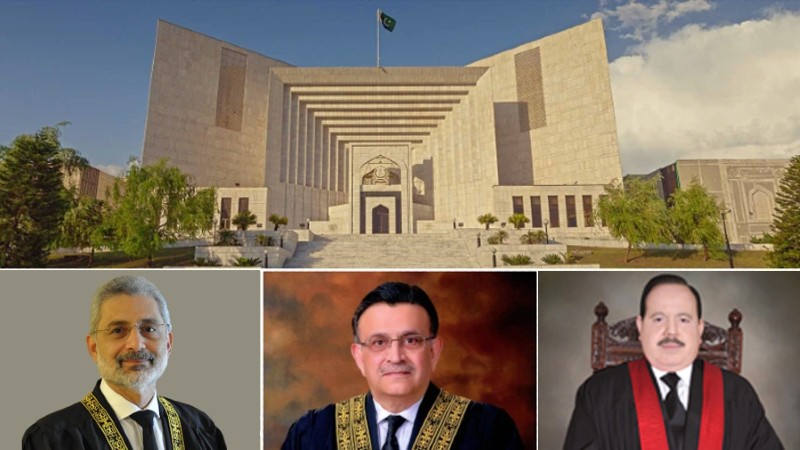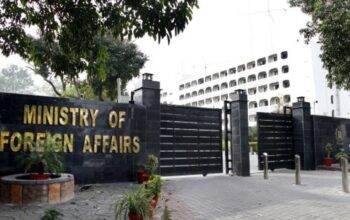A crusader top judge has taken it upon himself to address all ills of the polity above and beyond Constitutional sanction. What could go wrong?
By Ahmer Kureishi
It was not pretty. At all.
Firstly, the timing Justice Umar Ata Bandial chose for the Judicial Commission of Pakistan (JCP) meeting was dubious, as senior puisne judge Justice Qazi Faez Isa has vociferously and repeatedly pointed out.
Secondly, the Chief Justice of Pakistan (CJP) took it upon himself unilaterally to nominate five judges to the country’s apex court, to which he had no right.
Thirdly, the JCP threw out his nominations by a majority vote.
Fourthly, he left the meeting abruptly in a huff without recording the JCP decision or indeed making any announcement at all.
Fifthly, he signed off on minutes of the meeting contested by those who voted out his nominations.
How could this unfortunate series of damning debacles overtake the country’s foremost judge? After all, are not justice, equity, and propriety the primary preoccupations of a jurist?
Jurisprudence concerns itself with the correct application of the Constitution and law. The supreme court of Pakistan is the most hallowed of the hallowed seats of justice in the country, and the Chief Justice is the foremost of the defenders of the Constitutions.
The oath of a CJP binds him to discharge his duties and perform his functions honestly, to the best of his ability, and faithfully, “in accordance with the Constitution of the Islamic Republic of Pakistan and the law”. But here we see him openly flouting the Constitution and law.
Justice Bandial’s office, therefore, is to preserve, protect, and defend the Constitution of Pakistan. But here we see him single-mindedly pushing the agenda of packing the court with his handpicked judges without the slightest regard to the Constitution of law.
He is sworn to “do right to all manner of people, according to law, without fear or favour, affection or ill-will”, in all circumstances. But we seem him pursuing a course of action injurious to the most senior of his brother judges and the institution.
Even before considering his motivations for this conduct unbecoming of a jurist, one must question the soundness of his judgement. How could a sane person hope to pursue such a flawed course of action and hope to succeed?
Many people would invoke Justice Isa’s words when he warned Justice Bandial against hubris and egotism (takabbur and anaa), and they would be right. But underlying this hubris is the misplaced self-righteousness that seeped into our judiciary on the watch of Justice Saqib Nisar, and that has bedevilled our polity ever since.
This kind of hubris allows the Chief Justice to place himself above the Constitution and law, and to assume powers not tenable under the Constitution – like defending democracy and chastising the legislative at every opportunity.
Bandial and two of his like-minded judges were exercising those powers when they rewrote the Constitution in their ruling on Reference No. 1 of 2022 to mean party dissenters’ votes cannot be counted. The two dissenting judges on the bunch wrote as much in their dissenting note.
The benefits of this self-righteousness are obvious. It allows judges to pursue a duplicitous approach in dispensation of justice, treating one set of people with unreserved deference and another set with unlimited scorn.
In fact, the seemingly arbitrary approach to appointment of judges taken by Justice Bandial may well be calibrated to ensure continuity of the Saqib Nisar mind-set in the office of the Chief Justice.
For example, when you hoist someone at number 7 in the provincial High Court seniority list to a position in the apex court, you oblige them majorly, in the process undermining their ability to act independently of your thinking.
You position yourself to influence their decision making – considering they are not wedded to your brand of praetorianism in the first place.
Thus, you ensure the Supreme Court will be dominated through decades to come by someone prepared to turn a blind eye to, say, review petitions you have allowed to languish.
That course of action may not be viable anymore. The Parliament is already deliberating judicial reforms to remove the distortions introduced into the Constitution by the Nineteenth Amendment. In all likelihood, it will take particular care to exorcise the Supreme Court of any leftover demons of the Saqib Nisar mind-set.
Meanwhile, Justice Sardar Tariq Masood’s testimony has arrived in support of Justice Isa’s claim that the version of events related by the press release issued by Justice Bandial does not correspond to reality.
The claims these two honorable judges have made provide sufficient grounds for a presidential reference for misconduct proceedings against Justice Bandial.
On Friday evening, the Chief Justice ordered the audio recording of the proceedings of JCP meeting to be uploaded to the public website of the SCP, ostensibly in an effort to put to rest the controversy over what transpired in the meeting.
The SCP press release points out time slot 1:29:45 to 1:38:08 of the file as containing “the statement by the worthy Attorney General for Pakistan that the matters under discussion should be deferred to frame the appropriate rules”.
Listening to the audio, however, the Attorney General seems to second the position of Justice Sardar Tariq Masood, who did not approve the three nominees from the Sindh High Court and one judge of the Lahore High Court, and requested to defer the nomination of the chief justice of the Peshawar High Court.
The Attorney General then requests the matter of the elevation of judges to the Supreme Court deferred until the framing of the criteria to be used for evaluation of each individual nominee.
He does not request the meeting to be deferred, nor does he request the vote over the elevation of the CJ’s nominees to be deferred. This brings out the position taken by Justice Isa closer to what happened at the JCP meeting.
Under the circumstances, if the government does decide to file a reference against him, Justice Bandial will have to step down as the head of the Supreme Judicial Council and face proceedings for misconduct.
When that eventuality comes to pass, Justice Bandial may discover that it was his conduct both as the CJP and as the chair of the JCP that amounts to subversion of the Constitution, not that of Deputy Speaker Punjab Assembly Sardar Dost Muhammad Mazari.
Copyright © 2021 Independent Pakistan | All rights reserved




